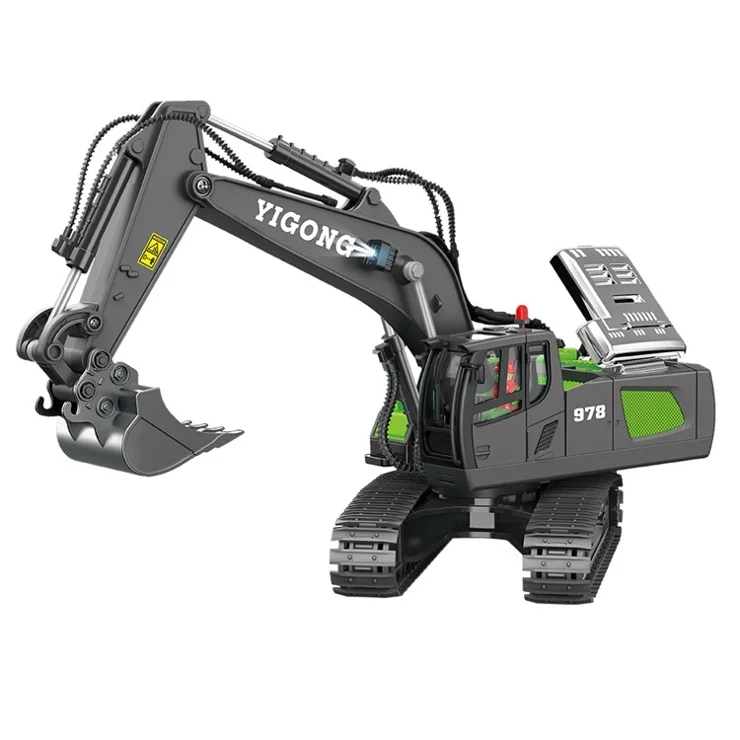Recognizing Just How Excavator Functions and Its Influence on Effectiveness
Excavators play an important duty in construction and mining procedures, relying upon an intricate interplay of mechanical and hydraulic systems. Their ability to do a variety of tasks pivots on both their style and the modern technology incorporated within. Recognizing these parts can significantly affect operational effectiveness and efficiency. As advancements proceed to improve the industry, one should take into consideration how these changes will certainly affect future methods and efficiency.
The Basics of Excavator Mechanics

The Duty of Hydraulic Solutions in Excavators
At the heart of excavator operation exists the hydraulic system, which plays a critical duty in powering the device's features and movements. This system uses pressurized hydraulic liquid to transfer power, enabling different activities such as moving, digging, and training. By taking advantage of the concepts of hydraulics, excavators can do jobs with exceptional precision and pressure, improving total operational efficiency.The hydraulic system includes vital components, consisting of valves, cylinders, and pumps, which function with each other to regulate the flow and instructions of the liquid. When the operator involves the controls, the hydraulic fluid is guided to certain cyndrical tubes, converting the driver's commands into physical motion. This system enables receptive and smooth activities, which are vital in construction and excavation environments. double e volvo rc excavator. The performance of the hydraulic system directly impacts the productivity and convenience of the excavator, making it a crucial component in modern excavation processes
Key Components of an Excavator
Recognizing the vital parts of an excavator is necessary for realizing just how this powerful maker runs. An excavator includes several substantial elements, including the undercarriage, residence, arm, boom, and pail. The undercarriage gives security and wheelchair, frequently including tracks or wheels to navigate various terrains. The residence includes the engine and hydraulic systems, allowing the operator to manage movement and power the device. The boom prolongs from your home, allowing upright reach, while the arm attaches to the pail, helping with digging and lifting operations.Additionally, the cab houses the driver, furnished with controls for accurate handling. Each of these components plays an important duty in the excavator's general performance, adding to its effectiveness and efficiency on building and construction websites. Comprehending these parts aids in maintaining and maximizing excavator efficiency, making certain tasks are finished safely and effectively.
Attachment Adaptability and Its Advantages
Add-on versatility is a crucial facet of excavators, enabling drivers to switch over between various tools tailored for specific tasks. This flexibility not just improves job effectiveness yet additionally adds to cost-effectiveness by lowering the demand for numerous devices. Comprehending the various types of accessories offered can considerably affect the general efficiency and functionality of an excavator on task websites.
Sorts of Accessories
While excavators are largely acknowledged for their excavating capabilities, their true adaptability depends on the broad variety of add-ons available. These add-ons boost the excavator's functionality, permitting it to do numerous jobs past excavation. Usual accessories include containers (for excavating and scooping), hydraulic thumbs (for realizing materials), and augers (for drilling openings) Grapples are made use of for dealing with and relocating particles, while rippers can damage up tough surfaces. Other specialized accessories, such as plates and plows, make it possible for excavators to adapt to details task demands. This diversity not just boosts the equipment's energy throughout different fields, including demolition, building and construction, and landscaping, but likewise permits operators to customize their tools to fulfill particular job demands effectively.
Raised Work Performance
Optimizing job effectiveness is a key advantage of using numerous excavator attachments. Various add-ons permit an excavator to perform several tasks without needing to change devices, conserving important time and labor. Utilizing a hydraulic hammer can damage concrete while a bucket attachment can excavate soil, making it possible for a seamless workflow. This convenience decreases downtime connected with devices modifications and enhances efficiency on-site. In addition, specialized attachments boost precision in tasks such as grading or landscaping, read the article leading to better end results. The capability to adjust to different task requirements not just enhances operations however additionally reduces the need for additional machinery, ensuring that projects are completed promptly and efficiently. Generally, add-on versatility substantially adds to enhanced work effectiveness in excavation work.
Cost-Effectiveness and Flexibility
Cost-effectiveness is a considerable benefit of using versatile excavator attachments. These attachments enable a solitary excavator to carry out multiple tasks, decreasing the demand for extra equipment and labor - double e volvo rc excavator. By changing in between pails, hammers, and grapples, operators can deal with various tasks, from digging to demolition, consequently making the most of tools utilization. This flexibility not only decreases operational prices however likewise reduces downtime linked with changing devices. Additionally, the capacity to tailor excavators with specialized add-ons improves productivity, as they can successfully deal with diverse tasks according to project needs. To end, the mix of cost-effectiveness and convenience in excavator attachments adds to enhanced operational performance and resource allocation in building and excavation tasks

Advanced Innovation in Modern Excavators
Modern excavators are increasingly outfitted with advanced innovation that changes excavation procedures. Automation enhances procedures, while boosted gas efficiency lowers functional expenses. Furthermore, wise control systems improve accuracy and security, marking a significant development in excavation equipment.
Automation in Excavation Processes
As excavation modern technology progresses, automation has actually arised as a crucial element in boosting performance and precision on task sites. Modern excavators are equipped with sophisticated automated systems that facilitate jobs such as grading, excavating, and trenching with marginal operator treatment. These systems use sensors, GPS, and artificial intelligence formulas to guarantee accurate positioning and depth control, considerably minimizing the margin for mistake. In addition, automation enables drivers to focus on calculated decision-making instead of manual controls, causing boosted productivity on the whole. Such technologies not only improve workflows however likewise enhance security by decreasing human error in complex procedures. The integration of automation in excavation processes represents a substantial improvement in construction technology, driving the market in the direction of higher efficiency and efficiency.
Improved Fuel Efficiency
Improvements in technology have additionally brought about significant enhancements in fuel performance for modern excavators. Modern machines are furnished with advanced engines that maximize power output while reducing fuel usage. These engines utilize innovative burning innovations, such as turbocharging and direct gas shot, to improve performance and performance. In addition, lightweight materials in building reduce total weight, permitting for much less power expenditure throughout procedure. The introduction of variable rate controls makes it possible for operators to change engine performance according to details tasks, additionally reducing fuel use. Consequently, these enhancements not just lower functional prices but additionally contribute to ecological sustainability by reducing emissions. Overall, improved fuel performance in excavators is an essential development that reinforces productivity and economic stability in the building market.
Smart Control Solution
While drivers browse increasingly intricate task sites, wise control systems in excavators have become essential tools for enhancing effectiveness and accuracy. These sophisticated technologies make use of algorithms and sensing units to keep an eye on numerous parameters such as lots weight, terrain problems, and operational performance. By immediately changing hydraulic functions, wise systems optimize machine performance, causing improved productivity and decreased endure elements. Furthermore, operators take advantage of intuitive user interfaces that offer real-time comments and diagnostics, allowing for pop over here informed decision-making. This integration of technology not only enhances procedures yet likewise lessens human error, contributing to safer work environments. As the building market continues to evolve, smart control systems will certainly play an important function fit the future of excavator efficiency and performance.
Enhancing Functional Efficiency With Excavators
Excavators play a vital duty in boosting operational performance across different building and excavation projects. Their flexibility enables for multiple jobs, including product, digging, and training handling, which improves process and decreases the demand for additional tools. With effective hydraulic systems, excavators can do durable tasks with precision, substantially lowering the moment required to full jobs. The integration of innovative modern technology, such as GPS and automated controls, additionally optimizes their procedure, enabling drivers to accomplish better accuracy and minimize material waste. Additionally, contemporary excavators are developed to eat less fuel and decrease discharges, contributing to both expense savings and environmental sustainability. By making use of excavators efficiently, construction teams can boost productivity, satisfy task target dates, and boost total website monitoring. This multifunctionality and efficiency make excavators essential tools in the modern-day building and construction landscape.
The Future of Excavators in Construction and Mining Industries
As the construction and mining industries develop, the future of excavators is positioned for considerable makeover driven by technical technology and changing operational demands. Advances in automation and artificial knowledge are reshaping excavator capacities, enabling enhanced precision and performance in operations. Autonomous excavators are arising, decreasing the need for human treatment and lessening the risk of accidents.Moreover, the combination of telematics and IoT technology allows real-time tracking of equipment performance and anticipating maintenance, enhancing uptime. Eco-friendly designs, consisting of hybrid and electrical designs, are getting grip, lining up with sustainability goals within the industry.Additionally, the use of sophisticated products and lighter layouts enhances gas efficiency while preserving efficiency criteria. As these trends development, excavators will play a vital duty in satisfying the enhancing demands for productivity and safety and security in construction and mining, ultimately transforming functional landscapes.
Regularly Asked Questions
Just How Do Climate Condition Influence Excavator Efficiency?

Weather conditions greatly affect excavator efficiency, as rainfall and mud can prevent traction and security, while extreme temperature levels may affect hydraulic systems. Operators needs to adapt to these variables to assure suitable functionality and security during operations.
What Safety And Security Steps Should Operators Adhere To While Using Excavators?
Precaution for excavator operators include wearing website here proper personal protective tools, conducting pre-operation assessments, guaranteeing correct interaction with ground workers, maintaining a secure distance from overhead hazards, and sticking to well established operational methods to stop crashes.
Exactly How Often Should Excavators Be Preserved for Optimal Performance?
Excavators should be preserved consistently to guarantee peak efficiency, usually every 250 operating hours or as defined by the maker. Regular checks improve integrity, prevent unanticipated breakdowns, and expand the lifespan of the devices.
What Is the Typical Life-span of an Excavator?
The typical life-span of an excavator typically varies from 10,000 to 15,000 hours of operation. Aspects influencing longevity include upkeep practices, running conditions, and the quality of the machine itself, impacting overall efficiency and effectiveness.

Can Excavators Operate Irregular Terrain Efficiently?
Excavators can operate properly on uneven terrain due to their articulated layouts and adjustable tracks. These attributes permit them to maintain security and traction, enabling effective procedure in difficult environments typically encountered in building and landscaping tasks. Each of these components plays an important function in the excavator's general functionality, contributing to its effectiveness and effectiveness on building sites. Making best use of task performance is a primary benefit of making use of different excavator accessories. While drivers navigate significantly complex task websites, smart control systems in excavators have actually emerged as essential tools for improving performance and precision. Excavators play a vital duty in boosting operational efficiency throughout various construction and excavation projects. Advancements in automation and synthetic intelligence are reshaping excavator capabilities, permitting for improved accuracy and performance in operations.